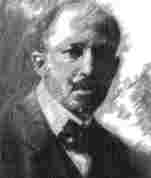The Educational Theory of William Edward Burghardt DuBois
February 23, 1868 - August 27, 1963
|
Analyst: Sandra Butts |

|
©2000 NewFoundations
|
Analyst: Sandra Butts |

|
RETURN
4/30/14
I. Theory of Value: What knowledge and skills are worthwhile learning? What are the goals of education?
Education and work are the levers to uplift a people. Work alone will not do it unless inspired by the right ideals and guided by intelligence. Education must not simply teach work - it must teach Life. (Phi Delta Kappa, p. 15)
We must train native races in modern civilization. (Clark et al, p. 283)
Urged fellow blacks to retain their cultural identity and to foster black art and literature. (Stafford, p. 55)
II. Theory of Knowledge: What is knowledge? How is it different from belief? What is a mistake? A lie?
Adhered to the philosophy of pragmatism and participated in the most advanced developments of modem thought. (Logan, p. 18)
"I hold it Truth: that every argument rests on an unprovable postulate which contains implicit the whole conclusion. (Logan, p. 18)
III. Theory of Human Nature: What is a human being? How does it differ from other species? What are the limits of human potential?
Black men must be treated as human, sentient, responsible beings, not as cattle. (Clarke et al, p. 282)
Proud of his people, not because their color endowed them with vague greatness but because their concrete achievements in struggle had advanced humanity. (Marable, p. 217)
He saw and loved progressive humanity in all its hues, black, white, yellow, red and brown. (Marable, p. 217)
Always human beings will live and progress to greater, broader, fuller life. (Barkley, p. 153)
IV. Theory of Learning: What is learning? How are skills and knowledge acquired?
Thought of education in the broadest possible social context. (Marable, p. 15 1)
Education and ability are not today matters of chance, but mainly of individual desert and effort. (Marable, p. 152)
Urged black universities to be centered on the particular economic, social, and political problems that confront Afro-Americans. (Marable, p. 136)
Attempted to construct "A Rational System of Negro Education" by reconciling the two widely diverting tendencies of the day, training for making a living and training for living abroad life. (Logan, p. 7 1)
V. Theory of Transmission: Who is to teach? By what methods? What will the curriculum be?
The small percentage of black intellectuals whom he referred to as "The Talented Tenth" should provide the strong leadership that the nation's blacks so desperately needed. (Stafford, p. 64)
The Negro race, like all races is going to be saved by its exceptional men. (Stafford, p. 64)
Wanted predominantly Black Colleges to redirect the contemporary curricula toward greater relevancy to society's problems. (DuBois, p. xxiv)
VI. Theory of Society: What is society? What institutions are involved in the educational process?
Black Americans are of a divided nature. Being black as well as American, they seemed to have two identities. (Stafford, p. 57)
Blacks had an identity that separated them from other Americans in society. (Stafford, p. 57)
The Negro is a sort of Seventh son, born with a veil, and gifted with second sight in this American world. The "veil" was the fabric of racism that kept blacks concealed from whites, and it also kept blacks from seeing themselves clearly. (Stafford, p. 57)
Black Americans should more strongly develop community institutions. (NAACP)
VII. Theory of Opportunity: Who is to be educated? Who is to be schooled?
The black man has to embrace the accepted goals of hard work, thrift, honesty and education. (DuBois, p. xxxvii)
Advocated higher education for the Negro. (DuBois, p. 130)
The outer courts of knowledge must be opened to all. (DuBois, p. 124)
VIII. Theory of Consensus: Why do people disagree? How is consensus achieved? Whose opinion takes precedence?
It is not enough for the Negroes to declare that color-prejudice is the sole cause of their social conditions, nor for the white South to reply that their social condition is the main cause of prejudice. Both must change, or neither can improve to any great extent. (DuBois, p. 209)
Only by the union of intelligence and sympathy across the color-line shall justice and right triumph. (DuBois, p. 209)
REFERENCES
Clarke, J.H. (1970). Black Titan W.E.B. DuBois. Boston: Beacon Press.
DuBois, W.E.B. (1969). The Souls of Black Folk. New York: Penguin Books.
Logan, R. (1971). W.E.B. DuBois. New York: Hill and Wang.
Marable, M. (1986). W.E.B. DuBois Black Radical Democrat. Boston: Twayne.
NAACP Headquarters, Baltimore, Maryland.
Phi Delta Kappa. (1996). Do We Still Need Public Schools? Washington, D.C.:
Center on National Education Policy.
Stafford, M. (1989). W.E.B. DuBois Scholar and Activist. New York: Chelsea.
| FURTHER information relating to W.E.B. DuBois can be found at The Capacity to Benefit from Formal Academic Schooling: two ideologies of distribution . |